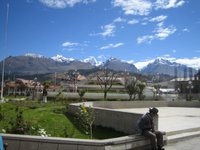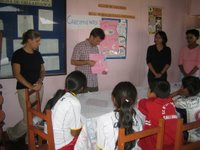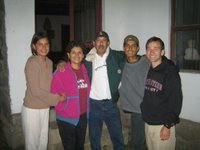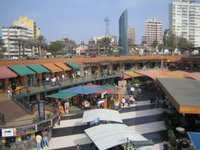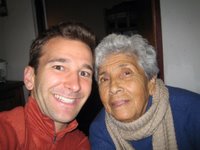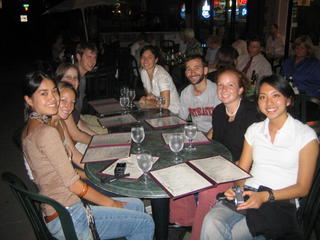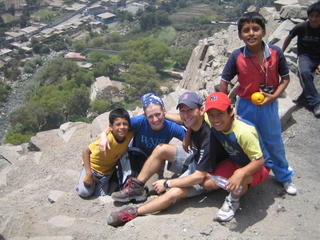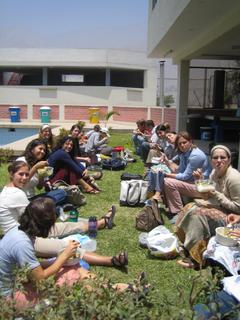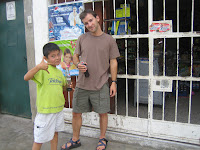Wow, time sure does fly… I hoped to have written an entry at the one month mark, but since last week slipped by so quickly, here’s to 5 weeks in-country! So much to report on…! My host family continues to amaze me everyday. They are so warm and affectionate. I’ve begun to understand my sister’s dry humor and have even developed a hilarious repartee with her. Her brother is just as cool, very eager to teach me about music and fútbol, help me with projects, and like every good brother, tease his sister. I met Blanca’s mom (the most eccentric grandmother) who stayed with us for a week. She a retired psych nurse, who’s very witty and wise. We could talk for hours. P.S. she’s the same age as Gigi!
Papi (Blanca’s husband) has come home the past couple of weekends and stays for a while before heading back to work which is 6-7 hours in bus. He’s a very educated, worldly man. I can tell he wishes he lived closer. He works for a Perúvian radio station. I’m convinced that this first month could have turned out much differently had I not had such a welcoming family. They are making the transition much more feasible.
Here’s a list of some things I’m still getting used to…..
Cold showers.
Getting electrocuted while taking a shower.
The milk and cheese.
Our morning wake-up by “Paulino” the parrot.
Saying hello to EVERYONE on the street, at all times of day.
Greeting women cheek to cheek.
Eating cuy. (More bones than meat, I’d try it again)
Throwing rocks at local dogs when running.
The constant smell of burning trash.
Hitch-hiking. (yep. It’s sketchy)
Eating soup with chicken claws in it. ---<
Breast feeding in public. (it’s just, normal)
Walking up every morning and convincing myself this is not a dream!
I’ve found a couple of favorite foods/dishes and drinks. The fruit here is alright but doesn’t compare to Costa Rica. Perhaps in another region the fruit is better. Beer is very cheep and not bad. There’s a malt brand I like (weird?) and of course the national cocktail, “Pisco Sour”-which is a great mixed drink. Aside from the food, I can feel myself slowly adapting to the Perúvian way of life, which is very laid back and passive. The general attitude is typical of many latin countries, “If it happens it happens, if not, we’re not going to worry about it”. Meetings often start late, sometimes hours late. Nothing every runs “on schedule”, and greetings are very important, both arrival and departure. One may ask, does anything every get done?! Yes, but at a different speed, in it’s own way. I just have to remain open to the “unexpected”.
Peace Corps pre-service training continues to kick our asses. We’re not even considered volunteers until we graduate. All the locals in this town know of the Peace Corps, because of the other groups that have come through. They call us “aspirantes” which means candidates or applicants to Peace Corps. We’ll “graduate”, and “swear in” in one month and officially start our 2 years of service on Dec. 3. The training hasn’t been that bad, it is very similar to other leadership trainings I’ve been through, for Americorps, or as a R.A. in college.
Learning/Improving my existing Español could be better. I was convinced that we would be speaking very little English when we got here but the majority of our training is in English. This is due to the fact that there is a large range in language abilities among the 33 of us. By the time our training is up we are all expected to be at an mid-intermediate level of Spanish. We had Spanish interviews our first weekend here, fortunately I tested above the minimum requirement. My class is basically a joke, not because it’s easy, because Peace Corps doesn’t really know what to do with us. I’ve had to take it upon myself to learn my grammatical hang-ups.
So although the language class isn’t stressing me out, the side projects are. We visited a very poor school and sat in on a class. The town is so bad off, the first thing the principal said to us when we arrived was, “I’m sorry”. (for the condition of the school) The walls were paper thin, supplies were at a shortage, many of the kids hadn’t eaten breakfast, and there was no running water. And yet, spirits were high, they couldn’t get enough of us, and made the most of what they had. We’re going back this week to do a play about hand-washing, bacteria and parasites.
We also visited a “comedor popular” our equivalent is a soup kitchen. This town in the mountains was much better off and small, but modern. All the roads were paved and although there are only three shared cars for 2000 people, most don’t need to leave the mountain. After working in the kitchen for a day, we came back two weeks later to give a presentation about nutrition, and hygiene. I even got to make an announcement over the town loud speaker to invite the farmers working way out in their fields. Our presentation was huge success.
This is my first position as a development worker and I’m beginning to see why Peace Corps exists. I didn’t need to study nursing for 5 years at a private university to be effective here. My common knowledge will take me very far. On of my challenges in being a successful change agent will be, helping to build a sustainable community without using financial resources from the outside. The old sayings, “Teach a man to fish, and he’ll eat for a life time”, and “It takes a village to raise a child” are proving to be true. Sometimes the resources are available, and the current state can improve it just takes a good idea and some motivation. God, I love this job.
I’m running in a 10k road race sponsored by Nike next weekend. 5 of us from P.C. are running together. I’m really not in shape to be running such a race but it’s mostly for fun and has motivated me to get out and exercise. It’s good for my mental health too. We had a Halloween party at my place this past weekend. I was a pirate. Complete with a hook and everything. My host dad’s ingenious ideas worked perfectly! I was impressed with the variety of costumes, everything from Freddy Mercury to a tapeworm (yeah Jocelyn!). We rocked out, devoured s’mores next to a bon-fire and indulged ourselves in some American foods, such as Doritos, Oreos, chip and dip, fruit salad, brownies, caramel squares, bruscheta, and the ubiquitous party favorite, Jello shots. Oh it’s good to be an American. It was probably the best Halloween I’ve had in a long time and it’s not even celebrated here! Until next entry…







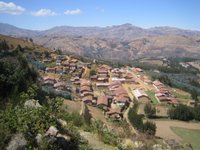
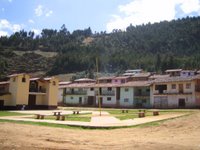
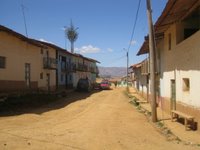



 Aerial view of Ancoraca
Aerial view of Ancoraca